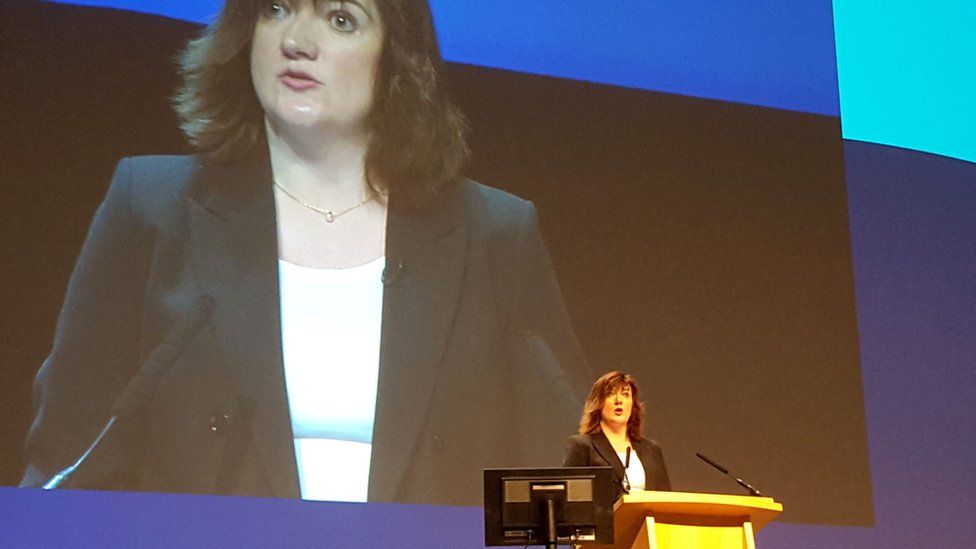Government climbdown over forced academies plan in England
- Published

Plans to force all of England's schools to become academies are being abandoned in a government climbdown.
Education Secretary Nicky Morgan hopes the concessions will meet the demands of Tory rebels opposed to compelling high-performing schools to convert.
This was about the government listening, she said, adding ministers understood top schools should retain the choice on whether to convert.
The move comes days after threats of industrial action by head teachers.
Academies are independently run - but state-funded - schools, overseen by a not-for-profit business, known as an academy trust. They are often part of a chain.
The controversial plans to require all schools to convert to academy status, or have plans to do so, by 2022 were announced in the Budget, but details followed in a white paper.
'Lift standards'
It was not long before opposition to the idea was heard from teachers and head teachers, education experts and MPs and councillors - both Conservative and opposition.
Mrs Morgan told the BBC in an interview with Education Editor Branwen Jeffreys: "This is about being a listening government and I would consider myself to be a listening secretary of state.
"Better to have reforms than have none at all.
"We absolutely support those strong local authorities where schools are good and outstanding - they can make the choice to convert.
"I hope that they will, because we are convinced that becoming academies does lift standards but they can do the right thing for them and I think that reflects the concerns and the conversations that we have had."
Conservatives have been voicing opposition to the plans in recent weeks, particularly because all schools - even highly performing ones - were to be forced into the new arrangements.
Innovation
Melinda Tilley, an Oxfordshire county councillor, complained of "diktats from above" and expressed concerns about small village schools closing.
Labour had argued that the academies programme was already hitting problems, with a number of large-scale trusts being sanctioned for failing to improve results fast enough.
Shadow Education Secretary Lucy Powell said: "It is frankly a humiliating climbdown for David Cameron and his education secretary, who just weeks ago were insisting they would plough on with the policy regardless."
However, the government said it would push forward with compelling academy conversions in two areas:
•Where it is clear that the local authority can no longer viably support its remaining schools because too many schools have already become academies.
•Where the local education authority consistently fails to meet a minimum performance threshold across its schools.
The government also announced a package of measures to protect small rural schools including extra financial support and a requirement that any closure would have to be agreed by the local authority and the regional schools commissioner.
Chairman of the largely Conservative County Councils Network Paul Carter said Mrs Morgan had "rightly listened to the concerns of councils, teachers, governors and parents in taking this important decision".
"This decision is also vital for the preservation of rural schools which are at the heart of their local communities," he said.
Russell Hobby, general secretary of the National Association of Head Teachers said: "We are pleased the government has listened to the profession.
"We stand ready to engage in further discussions about how the government can meet its vision in co-operation with the education sector. This move gives us hope that such dialogue can now be constructive."
The Local Government Association said its recent analysis of the grades achieved by all schools proved that 81% of council-maintained schools are rated as "good" or "outstanding", compared to 73% of academies and 79% of free schools.
"It is right that these schools should not be forced down the academy route unless they make that decision themselves," it added.
Analysis - by education reporter Hannah Richardson
Plans to require all schools, good or bad, to become academies have been greeted with increasing disquiet and derision since they were somewhat incongruously announced in the Budget.
George Osborne described the move as freeing schools from the "shackles of local bureaucracy".
Teachers and heads were bemused by the idea of forcing change on high-performing schools. "If it ain't broke, why fix it?" they chorused.
When fury exploded from the usually loyal Conservative MPs and councillors, the education secretary began to look very uncomfortable.
During an opposition day debate, it was the Tories who made the most effective arguments against the plan.
The divisions within the party were exploited by Labour at PMQs with David Cameron having to mount a robust defence two weeks in a row.
And embarrassment grew further when Nicky Morgan was greeted by head teachers heckling: "You're not listening."
With splits over the European referendum to contend with, Mr Cameron may simply have decided it was not worth a fierce fight with the backbenches.
Ministers had argued that the new landscape would provide a high level of autonomy to schools and help drive up standards through greater innovation and competition in the system.
Currently all schools can choose to convert to academy status, but those deemed to be struggling or failing to improve sufficiently can be forced to convert. That will remain the case under these new plans.
- Published24 April 2016
- Published7 May 2016
- Published25 April 2016